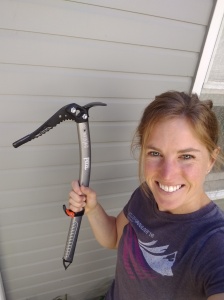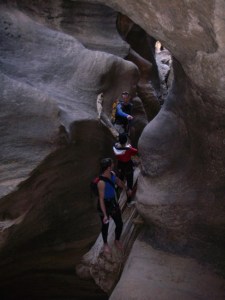When was the last time you went sledding? Doesn’t that sound great right about now, as we’re roasting in summer?

I tried to sled – without a sled – over the 4th of July weekend, high in the mountains of Colorado (about 11,000 feet). Technically I was trying to glissade, to slide on my feet or bum down snow so steep I was carrying an ice axe to stop myself if I got out of control. I wasn’t very good at it. I need a sled.
As a kid, I preferred inflatable snow tubes to plastic sleds. My dad would build an epic tube run in the snow from the top of a hill in the backyard. It banked hard around a treacherous curve to avoid a steep drop into the neighbors’ fence, then bounced down a series of stone steps. We called that section “the dumps,” because it wasn’t uncommon to dump there. If you made it around the curve and down the dumps, you hoped the bushes at the end of the yard stopped you before you flew out into the street.
As I grew up, there seemed to be less and less snow. I guess things always seem bigger to littler kids than they do to adults. But I remember building entire cave systems out of the snow piled on the side of the driveway from the piled snow. Maybe I was just much smaller.
Actually, no. I mean, I was smaller, but when you look at the numbers, Salt Lake City (where I grew up) gets less snow. I’m a 90’s kid (born 1985) who definitely went to see the new Lion King already (and was really disappointed by the version of “Be Prepared”). When I was tubing in my backyard on snow days, Salt Lake got on average almost half again as much snow as it gets on average now. Booooo.
And it’s not just Salt Lake. Lots of mountain ranges receive less snow than they used to. My colleagues in Colorado, where I live now, have studied the effects of snowpack on the soil microbiome of the mountains here. Just like the bacteria of our microbiome in our intestines help us absorb and process nutrients, microbes in the soil affect things like water quality and plant growth by processing nutrients.
When our microbiome gets out of balance, it makes us sick (ever heard of “C. diff. infection?”). Our systems don’t function the way we want them to. Changes to the microbiome of soils due to lower snowpacks and other ways in which humans are affecting the planet could change how our ecosystems function. We might not like those changes.
I say “could” and “might” because just like your doctor can’t usually tell you with 100% certainty how your body will respond to, say, antibiotics for a C. diff. infection or exactly when you’ll suffer a heart attack if you don’t change your diet, we don’t understand our microbial ecosystems well enough yet to know how big a deal this will be. Here’s how I think about that:
If I am planning to swimming at my local pool, or at a scenic mountain reservoir, I check the weather forecast. If it’s 30% chance of rain, I’ll probably go anyway and just get out of the water if I hear thunder.

But if I am going to rappel down a steep and narrow slot canyon into deep pools, a rainstorm could kill me in a flash flood. The sky might be blue when I start my hike, but a rainstorm even miles away could start a flood that would sweep down the canyon toward me, with walls too steep to climb out. When rain means unavoidable death, 30% chance is too high to even go there.
We don’t understand Earth’s microbiome well enough to know what works and what doesn’t. Heck, we’re only just starting to tweak our own microbiomes inside our bodies, and that’s just one of us at a time. It’s like we woke up sitting in water in the dark and not sure if we’re in a reservoir or slot canyon. So we might want to treat it like a slot canyon, in case it is. Because sooner or later it’s going to rain.
A bunch of people who make it their jobs to way overthink these kind of numbers agree. I just signed on to the recently published scientific consensus statement called Scientists’ Warning to Humanity: Microorganisms and Climate Change, or “Microbiologists’ Warning” for short.
This statement echos a broader consensus statement I signed in 2017 called World Scientists’ Warning to Humanity: A Second Notice. It’s an update 25 years after a statement from 1992 signed by 1,700 scientists then laying out the problem that we might be sitting in a slot canyon.
The message now? (Signed by >21,000 scientists, including me.) People, we’ve been feeling around and we’re finding walls. This ain’t no reservoir.
It’s time to get out of the water.
A study from 2017 calculated the relative impact of actions you can take to get us up and out of here. Here are the top recommendations:
- Eat a more plant-based diet (I wasn’t impressed with the much-hyped Beyond Burger, but there are some kick-butt black bean burgers out there…)
- Avoid airplane travel (want an excuse not to go to that one wedding or meeting?)
- Live car-free
- Have one fewer child (fewer people = less impact)
Obviously some of these are a big deal or unrealistic (we can’t all afford to live where we work when that’s Boulder, CO). But every little bit is a start. Try subbing in beans and grilled veggies and mushrooms on burritos one night instead of carne asada.
And tell your stories of what you have seen change. Tell them here. Tell them to your representatives. Tell them over family dinner. Especially when the numbers recorded show that it’s not just you…. there really is less snow.
And thank you. Now let’s go find some snow this winter. Bring your snow tube.
